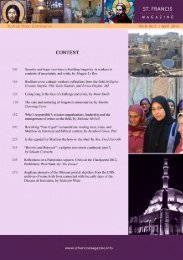download the pdf - St.Francis Magazine
download the pdf - St.Francis Magazine
download the pdf - St.Francis Magazine
You also want an ePaper? Increase the reach of your titles
YUMPU automatically turns print PDFs into web optimized ePapers that Google loves.
<strong>St</strong> <strong>Francis</strong> <strong>Magazine</strong> Vol 8, No 4 | August 2012<br />
about divinity be related to <strong>the</strong> godhead of Christ Or, more specifically,<br />
was it this sort of concept that led to <strong>the</strong> Nicene doctrine of<br />
<strong>the</strong> Word being “of one substance” with <strong>the</strong> Fa<strong>the</strong>r, as authors like<br />
Pagels and Baignet have suggested<br />
2 The Theology Of Christ’s Incarnation<br />
Against Pagels and o<strong>the</strong>r like-minded thinkers, I argue that <strong>the</strong><br />
<strong>the</strong>ology of God Incarnate goes far beyond <strong>the</strong> idea of an “incarnated<br />
god”. In biblical thought, <strong>the</strong> key concept is related to salvation<br />
and redemption, i.e. its main purpose is redeeming and saving humanity.<br />
This <strong>the</strong>ological <strong>the</strong>me is seen in <strong>the</strong> Old Testament and<br />
<strong>the</strong> Jewish rabbinic writings. It completely and fundamentally differs<br />
from <strong>the</strong> idea of gods’ incarnations in mystery cults and <strong>the</strong><br />
Greco-Roman thought. This Biblical presentation, which implies a<br />
soteriological dimension, contrasts with <strong>the</strong> idea of Christ being<br />
deified in <strong>the</strong> sense that Greek and Roman humans could be deified;<br />
indeed a doctrine of <strong>the</strong> “deification of Christ” could not serve <strong>the</strong><br />
Christian doctrine of salvation presented by <strong>the</strong> New Testament<br />
and as understood in <strong>the</strong> Orthodox Tradition.<br />
Christianity is considered a compound philosophy in <strong>the</strong> shape of<br />
coordinated systems of dogma and liturgical rituals that communicate<br />
<strong>the</strong> Word of God and his death on <strong>the</strong> cross as recorded in <strong>the</strong><br />
Holy Bible. The rituals are nothing without <strong>the</strong>se dogmatic bases.<br />
On <strong>the</strong> contrary, <strong>the</strong> bases of <strong>the</strong> Greco-roman cults are totally <strong>the</strong><br />
opposite. Their rituals do not express written texts or even oral<br />
ones, or dogmas or any philosophical justifications 2 . In fact <strong>the</strong><br />
Greco-Roman religions are related to rites more than faith. This is<br />
totally different from Christianity, which identifies a communal, ecclesiastical<br />
relationship with God in Christ, made known graciously<br />
by God and appropriated by faith in this message. The dogmas are<br />
lived out and experienced in <strong>the</strong> rituals of <strong>the</strong> Church, which in Orthodoxy<br />
are called mysteries (Arabic, asraar).<br />
2Ittai Gradel, Emperor Worship and Roman Religion (Oxford Classical Monographs),<br />
Oxford University Press 2002, p. 3<br />
<strong>St</strong> <strong>Francis</strong> <strong>Magazine</strong> is a publication of Interserve and Arab Vision 443







![Reflections on Surah Fatiha and the Lord's Prayer[1] - St.Francis ...](https://img.yumpu.com/49377951/1/184x260/reflections-on-surah-fatiha-and-the-lords-prayer1-stfrancis-.jpg?quality=85)









